“Hey! How are you?”
Mira Jacob is closing the gate in front of her apartment when she greets her neighbor. The two pause for a quick chat. New York City is covered in snow thanks to a recent storm, but today the sun is bright and the air is cold and clean. We are standing on a beautiful, small street in Brooklyn. Mira’s neighbor waves a quick goodbye and smiles. Mira smiles back, and will keep that smile on her face for the entirety of the afternoon.
Our walk will take us through Boerum Hill, then Cobble Hill, and then Carroll Gardens. Mira will introduce me to G. Esposito & Sons Jersey Pork Store, where we pick up Godfather sandwiches and slices of soppressata—a meat I’ve never heard of and have difficulty pronouncing—the tiniest bit of which Mira urges me to bring home to my dog.
Eventually we will meander down to the East River, where the wind off the water bites our faces and colors our cheeks. As we crunch through the snow, Mira keeps trying to turn the conversation off of herself and back onto me. Peppering me with questions, often causing me to turn off my recorder so I’m not stuck transcribing my own stories. But that’s who Mira is. She wants to talk. She wants to listen. She wants to have a conversation.
Which is exactly what we do, as Mira finishes closing her gate and we set off down the street.
Isaac: This feels like one of those classic, magical New York City blocks.
Mira Jacob: It's not a through street—blocked off at either end. So there’s a real sense of it being a tiny, micro-neighborhood. Some people have lived on this block for 40 years. My husband and I have been here for 20. So everybody knows each other. It's a real stoop block. Everybody sits on their stoop all summer long.
There are a lot of musicians who live here. One evening a month—during the height of the pandemic—everybody would gather to listen to our neighbors play their instruments. We would all sit on our stoops, waving to one another, and our neighbor musicians would put on a concert for us. A little monthly concert, for our little stoop street.
I: Were the musicians sitting on their stoops, too?
MJ: Better. They would gather in the middle of the street. The whole block became an outdoor, circular concert hall. They would play for a half an hour, or an hour. Then we would clap, wave at our neighbors, and go back inside. It was lovely.
I: That feels very Sesame Street to me. Sesame Street by way of New York City.
MJ: I mean, it’s still New York. It’s not without its politics. Its gossip. When I'm walking home someone will say, “Oh, did you hear about the thing?” And then I’ll get seven different versions of the thing over the next few days. One person will say, “You know what? Mike across the street is going to tell you something, but here’s what actually happened.” Everybody's got their version—and it’s usually about a missing trash bin.
I: Ok. Low stakes Rashômon by way of Sesame Street by way of New York City.
MJ: Yes. Also, you can’t stop change. Even streets like this are always changing. There are some—what we call “New Brooklyn” people moving in. Folks moving over from Manhattan. You can tell who moved here recently. On this block, almost everyone will say hello to you. “Good morning.” But newcomers give you that usual, New York cold shoulder. Which is normal for New York. I get it. But it’s not this block. I want to ask them, “Why are you here? What did you come here for? Did you come here to ignore your neighbors?”
I: “You can live anywhere in New York City and not say hello to people.”
MJ: Exactly. But we all—all of us that live here—we have this block.
I: What neighborhood are we in?
MJ: Boerum Hill. This is the walk I would take all of the time with my best friend. She would walk down Bond Street and I would walk up Bond Street and we would meet in the middle. It was always such a relief to see her. I could be in the worst mood and then she’d call me. “You want to go on a walk?” No planning necessary, which is amazing. We both have families and full-time jobs and kids, but she would call and say, “You got 20 minutes? Let’s go.”
I: Did the walk change during the pandemic?
MJ: We walked more frequently—much more frequently. Multiple times a week. And the walks were longer. We would meet, and then three hours later look up and say, “Are your legs about to fall off? Mine are about to fall off, too. Should we go back to whatever the fuck that all is back there? What we are calling our families and our homes? That crazy place where we've all become one, single body with three mouths and six eyebrows and we live on top of each other?”
Which is to say that the walks became even more important during the pandemic. These walks with my best friend were where I still felt like I was my own person.
I: I can’t help but notice that you’re talking in the past tense. Is your best friend still around?
MJ: No. She moved to North Carolina.
I: Damn. I mean—I was preparing myself for an even sadder response. But damn, I’m sorry.
MJ: Yeah, obviously not the worst thing, but I’m still sad. Very sad. She’s a writer—Alison B. Hart. I remember the day she told me that she was moving. I was at my son’s baseball game and she met me on the field and I immediately said, “Oh no.” Because I could tell by her face. You know how you can read your best friend’s face?
I: Yes.
MJ: She said, “I think we're going to move.” And I responded with, “Ok.” But I did that thing where you throw your voice several octaves higher because if you don’t, you're going to cry. Of course I get it. New York City is expensive. And that’s the age we’re at now. People have families. Many of my friends are saying, “We need to take care of our parents.” And that’s what she said. “I have to take care of my mom. I have to find some space for my daughter.” So she moved to North Carolina. And I have been phenomenally depressed ever since.
I: This happened last year?
MJ: She told me in March. She was gone by September. It happened quicker than she thought. She goes, “I found the perfect place.” So, of course I was happy for her. “Wonderful,” I responded. Then I went and sobbed.
I’m acutely missing her.
I: Have you told her all of this?
MJ: She knows. But the fucked up thing about your best friend moving is that the person who you most need to tell, “My heart is breaking and I can't breathe. I'm not myself anymore. I don't know who I am. I wake up and I don't know what's happening.” Well, it’s your best friend. But you can’t tell them that while they’re moving. They’re leaving New York City, and so many of their friends—not just you—and moving in general is hell.
I: You don’t want to guilt trip them.
MJ: Right. So she knows, because she’s going through it, too. It sucks all around.
I: So in a way, this is a replacement walk. I’m a substitute.
MJ: No pressure, buddy. But, yes. We're on a mourning walk. Because, honestly? I haven't been able to do this walk since she left.
I: You’ve lived on your block for 20 years. When did you first move to New York?
MJ: ‘97.
I: So, 25 years now. Is New York City your forever home?
MJ: I grew up in New Mexico, in a really small town in the desert. So I will always have this voice saying, “Go back to the desert.” That’s a feeling I’ll always have. But, yes. I love my life in New York. I love the life I have here with my husband, Jed, and my son, Z.
I: When you moved here in 1997, how’d you make it work?
MJ: At first it was all temp jobs. Then random gigs—I worked for a book packager at one point. That sucked. My boss at the time—I don’t think anyone could get away with this now—but I remember she took my computer away because she was angry with me one day and didn’t give it back for three months. Three months! She also threw a chair at me.
I: Jesus.
MJ: There was another woman—an executive assistant—who was openly and angrily racist toward me the whole time. She was not subtle. “I'm not sure why they hired you when you can barely speak English.” Which, you know, wasn’t true. “Weird thing is, lady. I was born and raised here.”
So there was a lot of that. A lot of terrible jobs.
I: What was your weirdest New York City job?
MJ: Do you remember Pop Up Video?
I: Yes, I remember Pop Up Video. You worked for VH1? How’d that happen?
MJ: They had an open call for writers. I knew what the show was, but I’d probably seen a total of one episode. Ever. I didn’t even have a TV—this is embarrassing.
I: No, it’s good.
MJ: Ok, so I didn’t have a TV. But I knew I wanted the job, and in order to get the job I knew I had to study the show. Back then Crunch—the gyms—they had a deal where you could get a tryout pass for cheap. I knew the gyms had televisions, so I got a tryout pass and went to Crunch when Pop Up Video aired and stood on a treadmill and studied the program.
I: What do you mean, “studied the program”?
MJ: I wanted to break it down. Figure out how the show worked. So, for example, I timed the pops. Standing in that gym on that treadmill—which I was not using—I’d figure, “Ok, that one took six seconds. That one took three seconds. So if it's this many lines, it takes three seconds to read. If it's this many lines, it takes six seconds to read.” I really worked on the timing. How many seconds passed between pops. How many pops were usually shown during a video.
I: You’re sitting there with a stopwatch but you aren’t timing your run or your workout, you’re timing the show.
MJ: I wrote it all down. Figured out the timing. Then I went home and wrote a script. Do you remember The Wallflowers and that song, “One Headlight”?
I: Do I remember American classic “One Headlight”? Yes. Yes I do.
MJ: Ok, so that was the video that I had to write a script for and I basically did all these pops that riffed about Jakob Dylan wanting to distance himself from his dad—Bob Dylan. Jokes about him trying to not trade in on his dad’s name, while still very much trading in on his dad’s name. I did that mean, punk-ass thing to poor, beautiful Jakob Dylan so I could get a job at Pop Up Video.
I: It’s ok, Jakob didn’t know. He wasn’t in the room.
MJ: So I finished the script and I sent it in and my main goal was to show off my timing and show off my humor. And I got the job.
I: How long did you work there?
MJ: Oh, one season and then I was gone. It’s funny, the job seemed like it would be so fun—
I: Television is hard.
MJ: It is. Also, I was the youngest person on staff. Everybody else had experience—I had timed out my script in a Crunch Fitness.
I: How old were you?
MJ: I was 26. You know who else worked there at the time? Julie Klam. She and I shared an office. She had written for Letterman and was awesome and kind and hilarious. She definitely kept me sane. A very, very kind person. Funny as fuck, but also kind. I felt very out of my depth there, and she would straightforwardly say to me, “Get your shit together.”
It was my first experience with locking up. Because everybody else there would say to me, “We hired you to be funny. You're not being funny.” You know when I get even less funny?
I: When people say that to you?
MJ: Exactly. I got deep in my head. Humor usually comes to me naturally, but there was so much pressure. Also, you realize that it’s still a job. I remember feeling like I had finally made it to the cool kids’ table. I thought everything was going to be fun and smart. But it was still a job.
There were two other South Asian sisters who worked there on the design side, and we all belonged to this group called the South Asian Women's Creative Coalition, which was a bunch of artists and writers of South Asian descent in NYC. It was such a small group. The meetings had 20 of us there on a good day.
One of my bosses—a white guy who had gone to fucking Yale—found out and was so irate that we were a part of that group. So mad that we went to these meetings. I remember him saying, “I'm going to find out where it is. I'm going to fucking go.” He was so furious that he was excluded.
We said, “Please don't do that.” And he responded, shaking with anger, “Why? Why shouldn't I? Why do you get to do this?” So furious that there was a space that would exclude him.
I remember thinking, “I thought these were the cool kids.” Turns out the cool kids are racist assholes like everybody else.
So there were moments like that. Racism in the humor. Another example, once there were a bunch of tits and ass jokes that were shitty to women—you know, “Haaha, women suck but at least they have boobies!?” And my feeling was, “Why?” So the bosses called me into their office and said, “Things are getting too politically correct around here. You're a real buzzkill. People feel that you can’t take a tits and ass joke.”
Which was wild. I told them, “No, it's just that clearly none of the people writing these jokes have ever been around a tit or an ass, or they would be funnier about it!” I kept thinking, “This reads like a rant from a bunch of angry Catholic virgins. Can't we be funnier?”
I: What year was this?
MJ: 1999. I still read interviews with a lot of the men that I worked with back then. Every single one of them will now say, “Yeah, that was a terrible time.” The ‘90s. So long ago, right? But nobody ever says, “Yeah. I sucked back then.”
I: “I was a part of the problem.”
MJ: “That was me.” Usually, when I’m looking back on my own history I realize all of the internalized racial oppression, internalized misogyny, hell, general asshole-ness that I had to grow out of. I recognize the ways that I was a part of the problem. How do these people—how are they not even a little bit curious about it? Curious about the reasons they were the way they were.
I: Growth is always more impressive than being perfect all the time.
MJ: Nobody is perfect all the time. And it’s important to be curious about the ways your past self failed others, failed yourself.
So yeah, one season and I was out.
I: Was writing always the goal when you came to New York?
MJ: Yes. I grew up in New Mexico and then left for college out east. First I went to Smith, then I went to Wesleyan briefly, after which I dropped out of school for a while. I lived a lot of different places—went back to New Mexico, eventually ended up in Seattle—before returning to school at Oberlin College in Ohio.
When I was out of school I’d been cooking in restaurants. I'd been waiting tables. But when I went to Oberlin I found out that they had a writing program. I so badly wanted to go to that writing program. The catch? You had to have applied by your sophomore year to get in, and I was no longer a sophomore. But I said to myself, “No matter what, I’m going to that program. I’m going to storm the gates. I’m going to go to that writing department with every short story I have—which, mind you, was five at the time—and they’ll see. They have to let me in.” I was fired up.
Then, when I showed up on campus, there was a note for me from the writing department, which read, “The admissions office showed us your application. We think you should be a writing major. Welcome to the program.”
I: No storming the gates necessary?
MJ: It was wild. The kindest reception. I was so happy.
I: Sounds like you were interested in writing from a pretty young age. Did you grow up wanting to tell stories?
MJ: If you grew up like I did, in an immigrant household, there is this sense of a constantly disappearing world. A place—an idea of a place—that is never going to come back. And you are the only witness to it. You are the witness to your parents' great grief, that this world that they were a part of is of disappearing behind them.
I: Your parents moved to New Mexico from India not long before you were born, correct?
MJ: They had known each other for about a month.
I: An arranged marriage?
MJ: An arranged marriage.
They never moved back to India, but they really thought they would—they figured they were only in America for a few years. Which is to say that there was this huge grief—this longing for this place that I had never been to. They would say, “This place is yours, too. You don't know your wonderful inheritance in this world. The wonderful culture we come from.” And they were right. I never considered myself Indian growing up—until I was around other Americans. Other kids at school. Then I realized, “Oh, I'm Indian.”
But that thing—that longing and that grief for this place—it always made me feel like I had to write everything down, because they were losing it. I had to write it all down so that my parents wouldn't lose it.
I: Wow. You had to record it. So that you could keep it, too.
MJ: Yes. Also, so that they could keep it. So I could say, “It's ok. It’s here, guys. Do you remember that story you told me? Look. It's here.”
I: That’s beautiful. When does drawing become part of your storytelling process?
MJ: When I was working on The Sleepwalker's Guide to Dancing—which took me about 12 years to write—whenever I didn't know what the next scene was about, I would draw an item from that scene so that I could relax. Lynda Barry says this thing that is so true, that when you draw the movement of a line it relaxes your brain. Much in the same way a walk can. You begin to process things differently. So, if I was locked out of a scene, I would draw, say, a jar of mango pickle. If I drew that jar I could figure out what needed to happen in that scene without it being forced. It gave me a new perspective.
In the course of drawing a jar lid, it would begin to occur to me what the characters would be saying to each other. If they held the jar this way, then this is going to be the conversation that they’re having. It would just relax me enough to be able to believe in my characters.
I: That’s amazing.
MJ: That’s not when I started drawing. I had been doing that for a while. My journals were insane. I have all of these painted journals—me simply trying to put things together with lots of paintings and drawings and words. But I really started using it to help myself figure out scenes while working on The Sleepwalker's Guide to Dancing.
The only thing I didn't know how to do was draw people. Which is why I thought to myself, “Why not do a whole book filled with drawings of people. That'll be fun.”
I: Now we’re talking about Good Talk, your second book. How did you go from drawing as a process to help you with your fiction to saying, “I’m going to write a graphic memoir”?
MJ: Conversations are so important to me. Again, my original interest in storytelling were to capture the stories of my parents, right? The conversations I had with them. So I realized that I could do a book filled with only drawings and conversations. I don't have to do a lot of world building. I can quickly get to the good part. I can get to the part that I like, which is the talking.
Plus, it felt personal. Which is what a memoir is. Personal. Every conversation I wrote—every moment I tried to capture through drawing— it really was just for me. That whole book was for me. I wrote it just for me.
I: Your first book is a novel, your second is an illustrated memoir. Do you tackle fiction and nonfiction differently?
MJ: Completely. There's an intensity in the freedom of fiction. You are trying to figure out how to carve out a story from all the possibilities. All of them! In memoir, you are trying to figure out how to carve a story from the realities. Now people have different truths—different realities. Kiese Laymon’s Heavy tackles that incredibly well. But there’s still more limits than in fiction, where anything is possible. So writing fiction as opposed to memoir is an inherently different process for me.
I'm writing a novel right now about a white-presenting Indian actress who's murdered. So I’m asking myself questions about what needs to be down on the page and what doesn’t. There are so many possibilities for how I can tell that story, which is also true of memoir, but again, you’re working within different boundaries.
I also find that my body feels different when I’m writing fiction as opposed to memoir.
I: How so?
MJ: With fiction, there’s this feeling of panic. Like being at the top of a ski slope. “Wait. What am I doing up here? Which way? How? What do I do?” Whereas with memoir, it's a real deep thinking place for me. It's not a feeling in my body. It's more this feeling of, “I really have to keep my wits about me.” I have to make sure I honor the dialogue. I have to stay true to the moment and what happened. I have to be careful not to turn it into what I wish happened.
Because I often find with memoir—there's always this point at which you want to write the better story. You are tempted to make it a more exciting story. But if you don't, if you sit with the reality, then it becomes its own miracle.
I: You are somebody who believes in the power of conversation.
MJ: For sure. I love it. Talking is wild.
I: What do you mean?
MJ: Think about it. The thing that we were given—evolutionarily—to try to be with each other is talking. Talking is so fucked up. It's such an imperfect way to do anything. Right now we’re both talking, but we’re also thinking, we’re distracted by what’s going on around us. I might say something that means one thing to me, but you might interpret it in an incredibly different way than I meant it. But we all still do it. We keep talking. We keep communicating. I love that we keep going.
I: It's a loose gathering of rules and agreed upon noises.
MJ: One person makes noises out of their mouth hole at somebody else who is receiving those noises through their ear holes, but that person is also thinking about the noises they're about to blow out of their own mouth hole at the other person’s ear holes. When you really think about what talking is it’s completely nuts.
But also, I love that we—being the weird animals that we are—we all agree, “Yeah, I'm going to do this again.” We say to each other, “You know what? I'm uncomfortable. So here’s what I’m going to do. I'm going to talk to you about it.” Which is almost always a disaster. But we keep doing it. We keep trying. We all believe, “Talking will solve this. We’ll talk it out.” Did it work? No. But then we try again. “This will work this time. The talking will work. Maybe not today, and maybe not tomorrow. But one day the talking will work.”
I: And do you believe that? That the talking will work one day?
MJ: Absolutely. Fuck yeah. I'm one of those dumb animals. I'm totally one of those dumb, sweet animals. We're in a human experiment together. So every day I say to myself, “Surely, this time I will explain it well enough. These people agree with me this time. This time I will feel understood.”
And that’s the magic of it. Every once in awhile? It does work. Sometimes you do feel understood. Sometimes you really do. Which is beautiful.
I: Do you have an example of a talk where that happened, recently? Where you think people came to an understanding? A—apologies for doing this—good talk?
MJ: Z and I were talking last year and—you know, his dad's white—so we were talking about race and he said, “Wait, mom. Do you think that all white Americans are racist?” And I try to be honest with Z, so I responded “Yeah, sure.”
Because that’s legitimately how I see it. It's not about people being good or bad, it's about how they are raised and how much they know or don't know about their own history. How much they are taught to constantly center their own goodness, which sometimes means acting like that history didn't happen, or that it isn't still happening today. So I said all that, and I told him that I think the rest of us are struggling with various kinds of internalized racism, which is its own thing to work through because if we don't, we hurt each other. It’s a complex conversation for sure, but I try not to avoid those conversations with Z. And at the time, he's not happy with me. He’s half white, and it hurts his feelings. He says, “I don’t believe any of that.” Which is completely his right, so I say, “Yup, you're allowed to have your own opinion. I love you.” And we move on with our day.
Unbeknownst to me, two weeks later, he's running around with kids in his class—he’s in the sixth grade—and one of them says, “Why do we always split up teams between the boys and the girls?” And Z says, “Oh, because sexism is everywhere! We don't mean it to happen, but it’s just how it goes. Like racism, like how all white people are racist, even if they don’t know it.” And everyone goes, “Wait, what?” One student says, “Did you just say all white people are racist?”
Which is when I get a text from Z. “Mom, I told the white kids that all white people are racist and they're really, really angry with me. They didn't like it at all.” And I text back. “Yeah, no, they're never going to like that. Come home, I'll make you some tea, we can talk about it.”
Well, the kid gets home in record time, runs up the stairs, starts hammering on the door. He's shaking so hard that he can't use his keys, so I come down and let him in. Now I’m worried. He bursts into the house and says, “They surrounded me. They said they're going to beat my ass! Everyone hates me now!”
I: Jesus.
MJ: And these kids are his friends, so he asks me, “Why would they do that? I thought they would want to know. Now they say they're going to hurt me.” And I tell him we don’t have to talk about it right now, that it’s ok to just feel sad, but he’s fired up. He wants to figure it out—fix it, you know? So I’m saying, “People don't like being told they're racist, ever. You got upset too, remember? You can understand why it's painful. They think you're saying they're bad people. But it's not about that. People aren't racist because they're bad. And there are good people that love me and are also racist to me. It sucks. When that happens, I get so confused and so hurt.”
Anyhow, we're talking and meanwhile, he’s getting all of these texts—a wall of texts—from kids who are very, very angry at him. They're telling him that they don't like him anymore, that now they see who he really is, that they're going to humiliate him. Eventually a parent even reaches out to me, so I decide that I should probably tell the school what happened. I have no idea how any of this is going to go over. I figured the school would be upset, or tell me the conversation I had with Z was wrong, or simply try and ignore it. But anyway, I write his homeroom teacher—a Black woman—and explain what happened.
She writes back, “I'm so sorry to hear that this happened.” She goes on to say, “It's really interesting that the white kids were both furious about being called racist and also surrounded him in a mob and threatened him. I wonder if, in that moment, they understood what they were doing.”
That response has never happened in my life. Truly. His teacher went on to write how this kind of thing is painful but also a good chance to learn. “If we're going to call ourselves an anti-racist school we will have to step up and have a talk.” Which was honestly news to me! I didn't even know this Brooklyn public school called itself anti-racist.
I was dizzy with relief. Just the fact that they took it seriously. And they did it. They had all the students sit down and the other students were saying, “Well, that’s not how he said it the first time—that it doesn’t mean you’re a bad person. He didn’t say that part. We wouldn’t have gotten upset if he had said it that way.” To which the teacher responded, “Ok, but am I to understand that 20 of you surrounded him and said you were going to beat him up?" And they said, “Yeah.”
And she said, “So when was that supposed to happen? When was he supposed to have the time to say, ‘but this doesn’t make you bad people’?” But they persisted. “It really hurt our feelings the way he said it." So his teacher finally says, “I hear that you guys are really hurt. Can you tell me about that? Why? What hurt?”
One kid says, “It was like he didn't know us. He just decided who we were.” And she says, “So you feel bad because he made—what felt to you—like a lot of bad assumptions about you. Ok. I get that. So here’s what I want you to do. I want you to look around the room at every Black and brown student here and know that they feel what you are describing daily. Every single day. And I know this because I'm your teacher and I feel it too. Sometimes, from some of you.”
I: Goddamn.
MJ: I know, right? Z comes home, tells me “Mom, it went pretty well, but I cried twice. The first time was when they said that I wasn't taking it seriously, because when they surrounded me I got on my phone and was texting. But I was texting you because I was scared! So I told them, ‘I was texting my mom!’ And I cried. Is that bad?”
I said, “Nope. It's ok for them to know you were scared and it maybe didn't look like scared to them.” And he says, “The second time was when the teacher said, ‘I know it because I feel it, too.’ She said it like you would say, ‘It’s warm outside today.’ Nothing emotional in her voice. No anger, no judgement. She was so calm, just stating a fact. I don’t know how she didn’t cry because when she said that I was crying. It was such a relief to hear a grown up just say it out loud, you know, for all of us.”
So I said, “And that's when you cried?” And Z said, “Yeah, that’s when I cried.” And I said, “Yeah, I think I’m going to start crying too.”
There was so much more to it. A lot of the kids reached out to Z. One Black girl in his class was like, “My uncle says you’re right. He’s a music promoter and he wants to send you a t-shirt.” Other parents and I talked.
I: The teacher allowed the conversation to keep going, and that led to more conversations.
MJ: Exactly. And this all happened the same week Texas and Georgia put up bills banning Critical Race Theory so, you know, the world keeps being the world. And I’m sure some of those students are still working through it. But thanks to that teacher, they had a really good, difficult talk.
By now we have made our way back to Mira’s idyllic block. She’s regaled me with stories of seeing the entire cast of The Sopranos years ago at a bar then owned by Michael Imperioli— “In New York you play it cool around celebrities, of course, but every single person in that bar ran outside and then simply turned around and stared at all of them through the front window”—and the projects that husband, Jed Rothstein, is currently working on—“it’s a musical about Rudy Giuliani and Jed is simply having the best time. He’s so happy!” We’ve been walking for hours, yet there’s still so much more we could talk about.
But Mira has to get home. She has a zoom meeting with one of her students, and Z will be home from school soon. Before she goes, though, I have one last question.
“Do you know when you’ll see your best friend again? The woman you usually do this walk with?”
Mira smiles. “You know what? We do this thing now where we get on the phone and go for a walk together. It’s not the same, but it’s close. It’s so good to just walk and talk with my friend.”
I ask her if she planned that ending. If she knew she was going to tell me about these phone walks.
“I did not. But there you go. There’s your ending.”
We hug goodbye and she goes inside. The light has changed. The sun is lower in the sky. But Mira’s block still looks beautiful. Not having anywhere to go I sit on her stoop and begin to eat my sandwich.




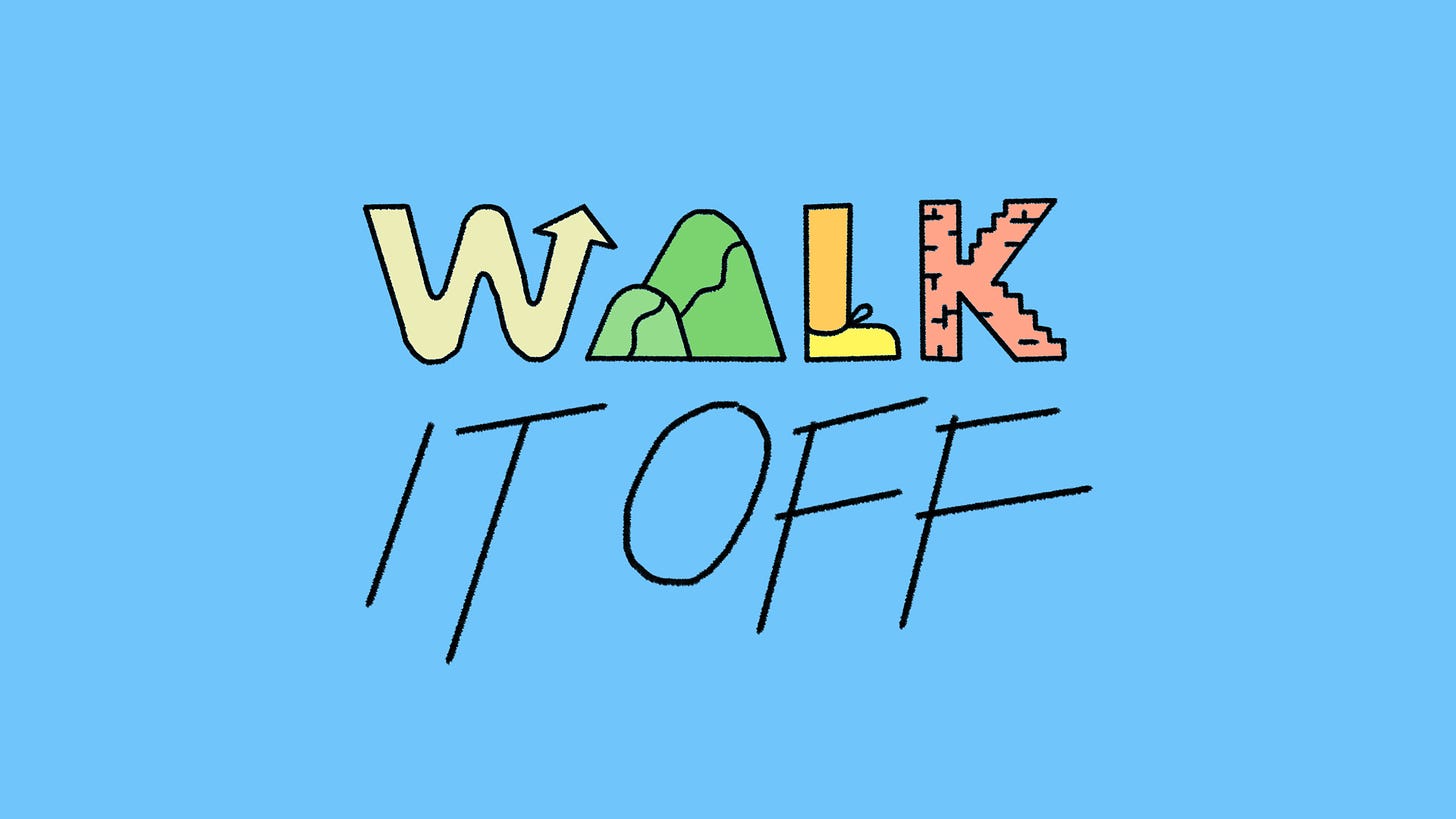

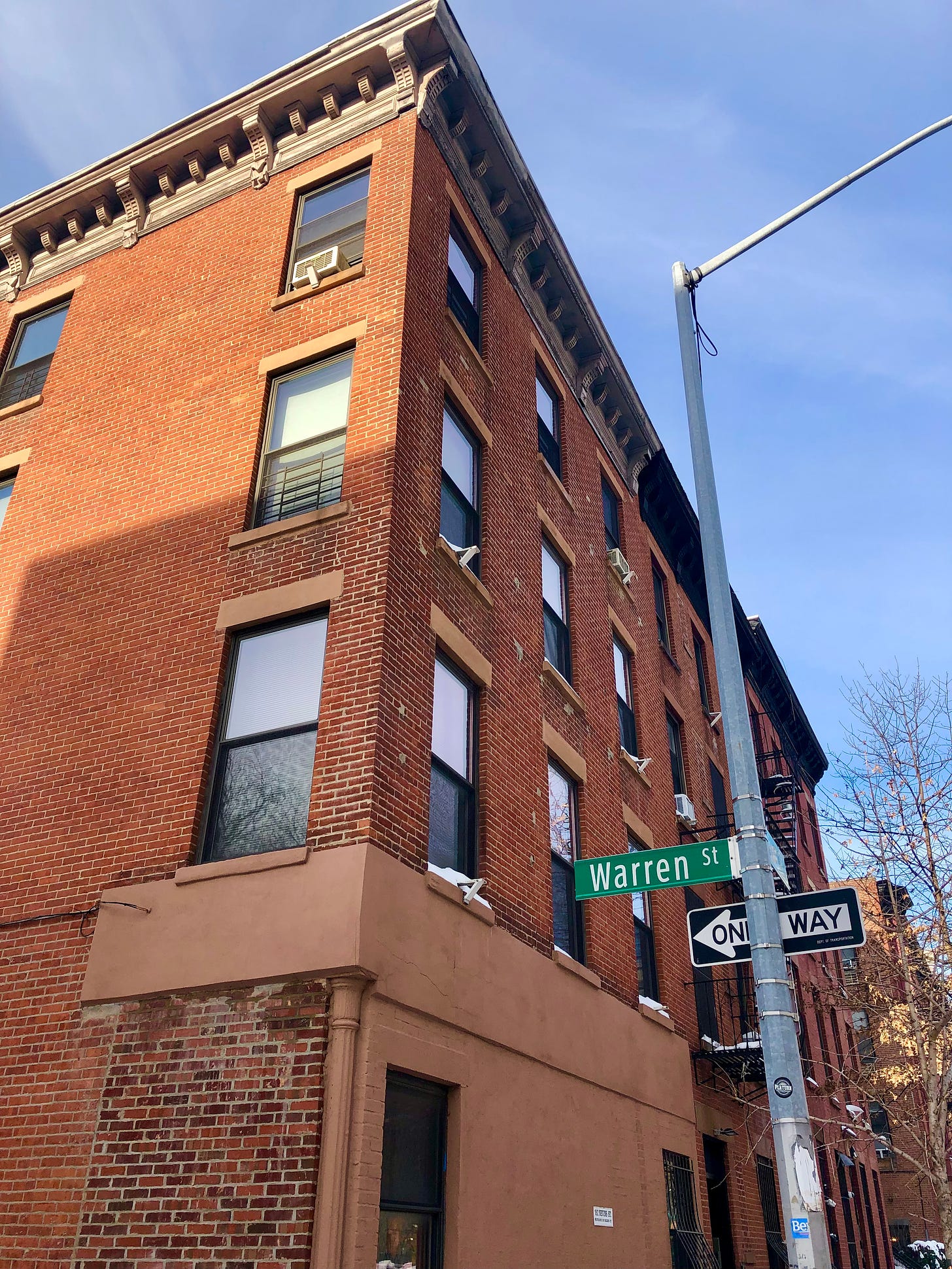

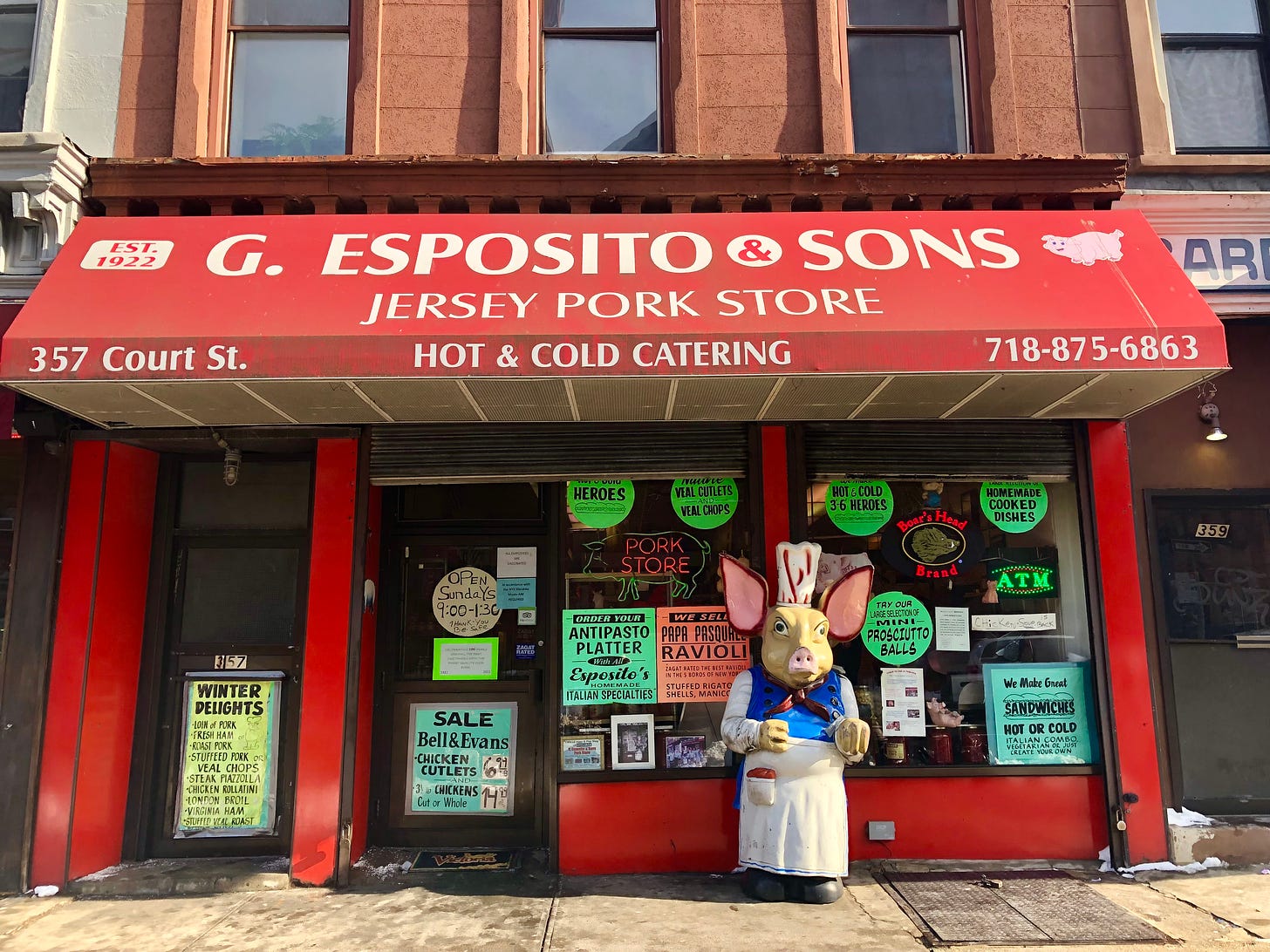
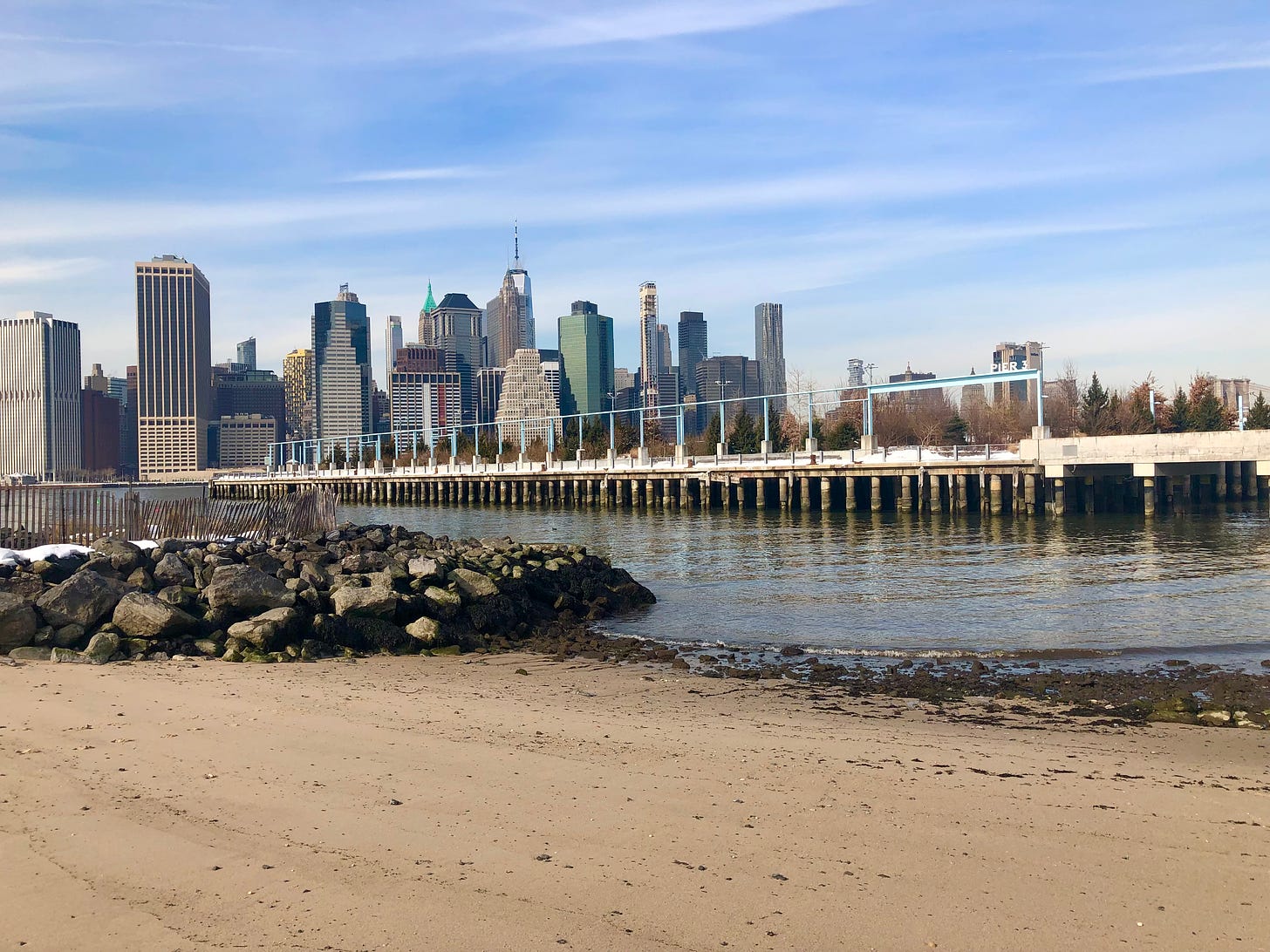
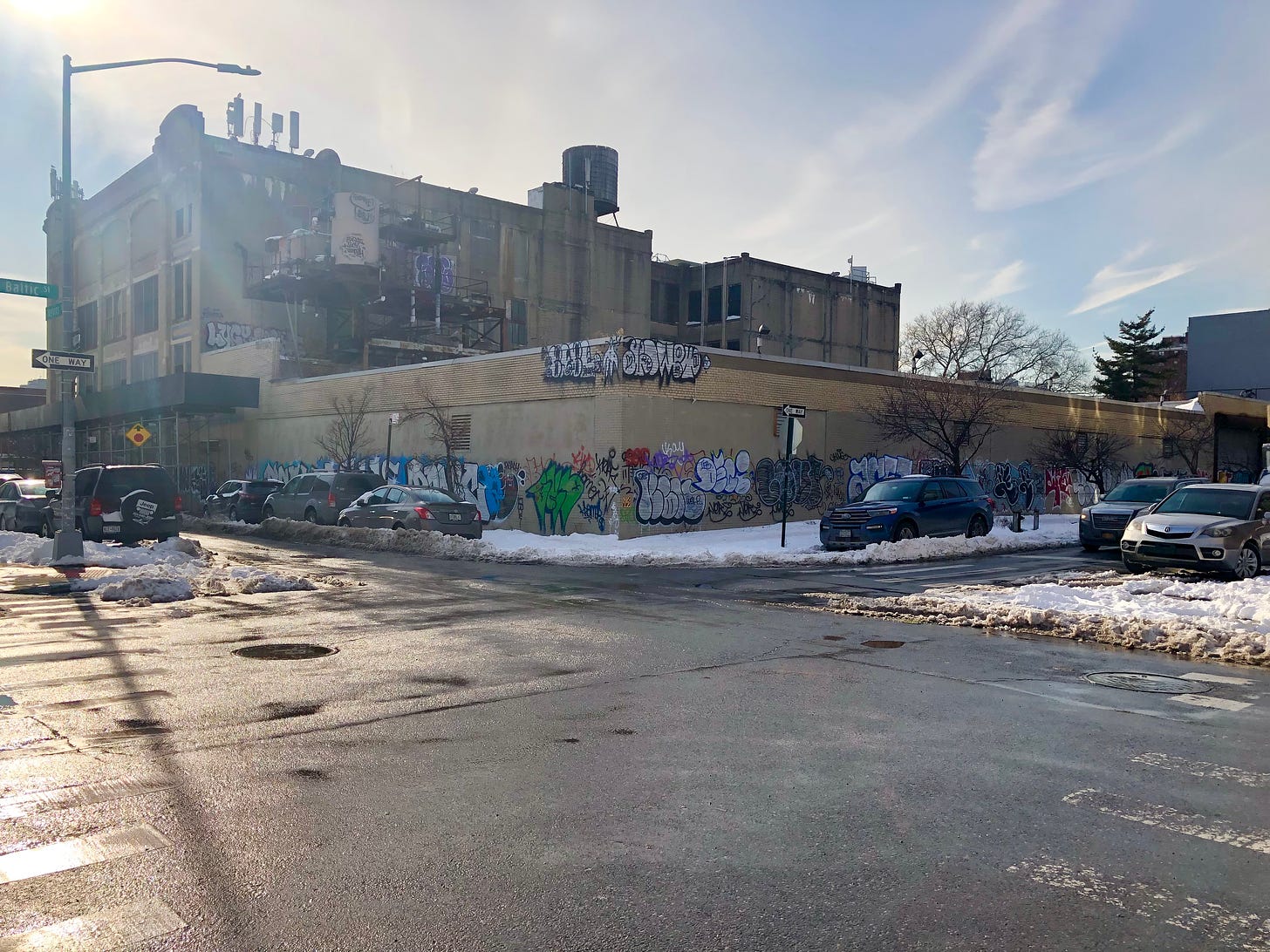
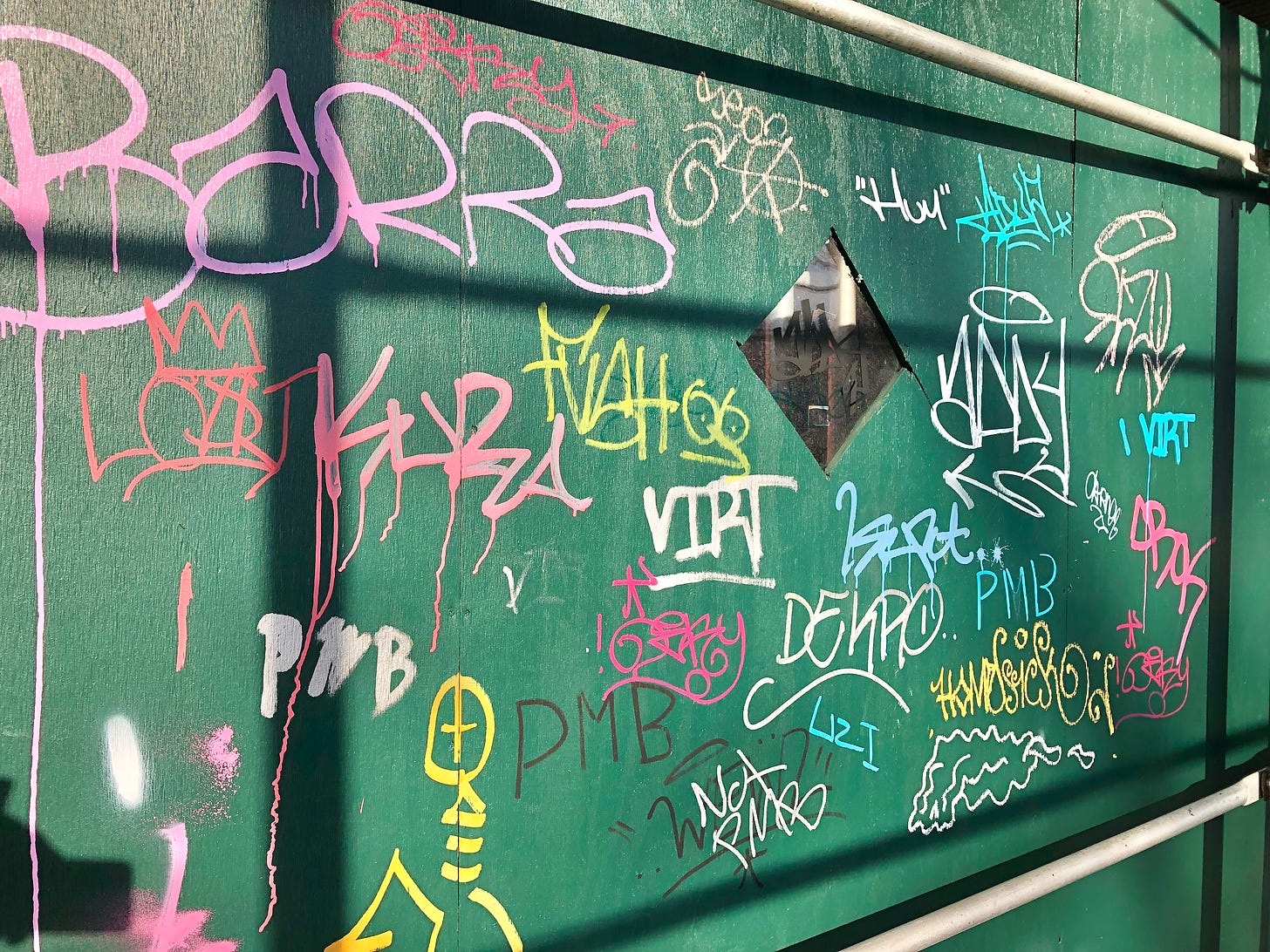
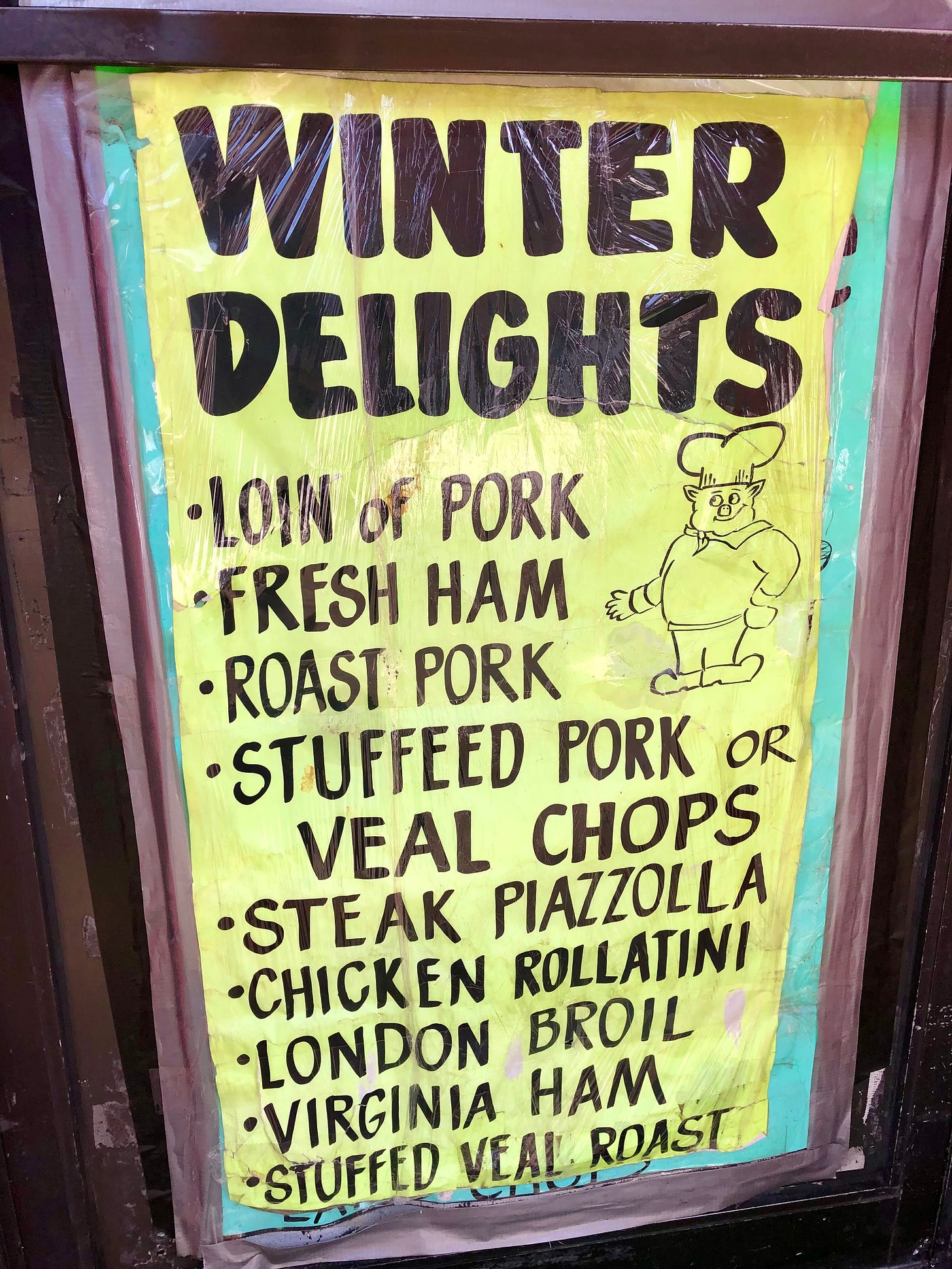
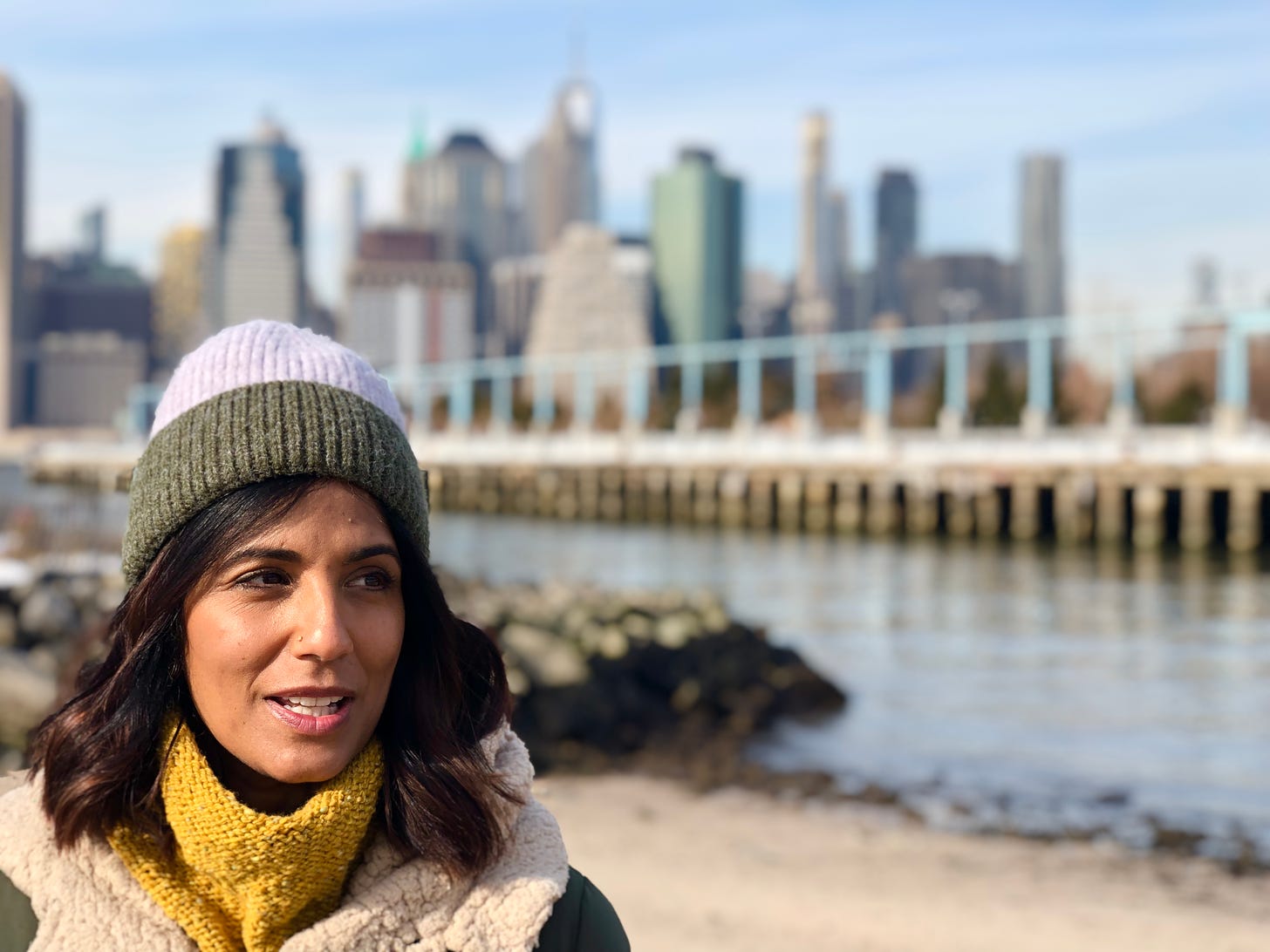
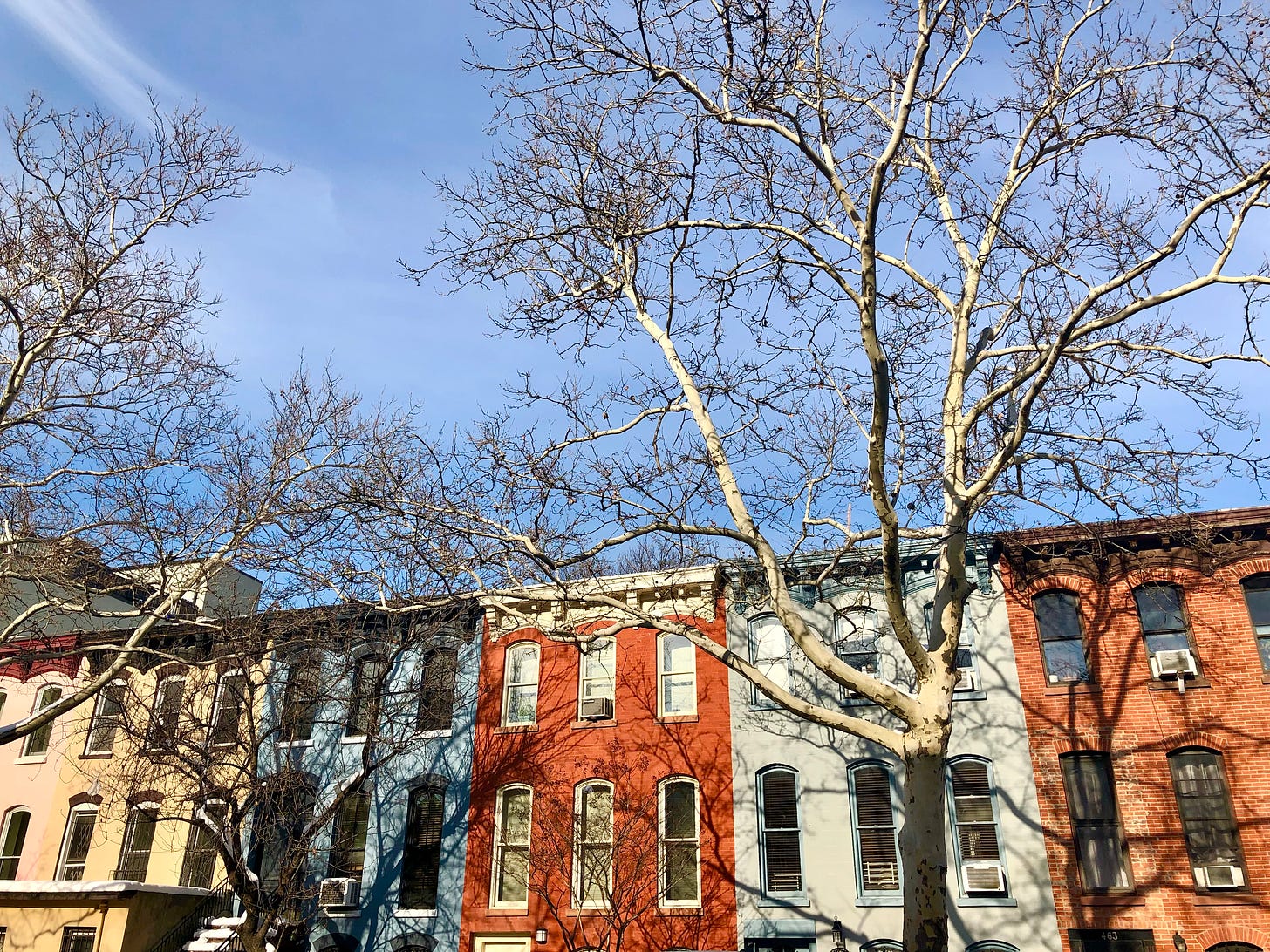
This walk left me feeling like I read a novel. I felt the physical absence of Mira’s best friend, I cried with Z at the words of his teacher and I wished I lived in a stoop neighborhood. A lot to ponder in this lovely walk. Thank you Issac and Mira.
This was perfect...as though I'd just experienced a 3-act play...utterly personal and completely relevant to the broader societal moment.